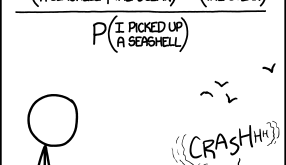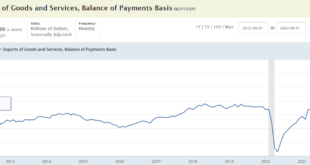from Lars Syll Mainstream economics nowadays usually assumes that agents that have to make choices under conditions of uncertainty behave according to Bayesian rules, axiomatized by Ramsey (1931) and Savage (1954) — that is, they maximize expected utility with respect to some subjective probability measure that is continually updated according to Bayes theorem. If not, they are supposed to be irrational, and ultimately — via some “Dutch book” or “money pump” argument — susceptible to...
Read More »Exports, employment
This is adding support to employment and output, even as consumption weakens. The relatively low cost of energy should keep it going for a while: No sign of recession here: Still falling short of price increases so obviously not the cause:
Read More »Open thread August 5, 2022
Tags: Open Thread Aug 5. 2022
Read More »The left debating basic income
from Norbert Häring Universal basic income has a lot of support among the left but also faces a lot of criticism or even hostility from the left. As on of the critics of I have used a book defending basic income against criticism from the left to check my beliefs against counter-arguments from the same side of the political spectrum and to clarify the reasons for not being convinced. One of Karl Reitter’s arguments in his book “Kritik der linken Kritik am Grundeinkommen” has indeed...
Read More »Manufacturing PMI, construction spending, hires, loans
Still in positive growth: A bit softer after a post-Covid acceleration: Took a zig down last month but still very high and still trending higher: Lending continues higher well after the rate hikes, which presumably work to cut demand by dampening lending:
Read More »Open thread August 2, 2022
Tags: open thread
Read More »Mental health and mental fitness
Until now, I’ve always thought about mental health as the absence of mental illness, much as I have typically thought about the absence of physical illness. In both cases, health is the default state or unmarked category. But as I have gone through the Covid pandemic, and become more pessimistic about the state of the world, I have reached the view that a better analogy is with physical fitness. That is, something that requires sustained effort to achieve and maintain, and is rarely...
Read More »Economics and the law of the hammer
from Lars Syll [embedded content] As yours truly has reported repeatedly during the last couple of years, university students all over the world are increasingly beginning to question if the kind of economics they are taught — mainstream economics — really is of any value. Some have even started to question if economics is a science. My own take on the issue is that economics — and especially mainstream economics — has lost immensely in terms of status and prestige...
Read More »The reinjection of empirical ideas
“As a mathematical discipline travels far from its empirical source, or still more, if it is a second and third generation only indirectly inspired from ideas coming from ‘reality’, it is beset with very grave dangers. It becomes more and more purely aestheticizing, more and more purely l’art pour l’art. This need not be bad, if the field is surrounded by correlated subjects, which still have closer empirical connections, or if the discipline is under the influence of men with an...
Read More »Neoclassical clunkers. How economists’ ideas about risk aversion are duping pension pundits.
(Part of) the Dutch pension system will, if everything goes according to plan, soon be replaced with a new neoliberal system based upon, among other things, measured neoclassical ‘risk aversion’. However – economists are not yet able to measure this – which will lead to big problems. let me explain. The present system consists of: a social democratic element (the ‘first pillar’), a kind of not means tested basic income for everybody...
Read More » Heterodox
Heterodox




